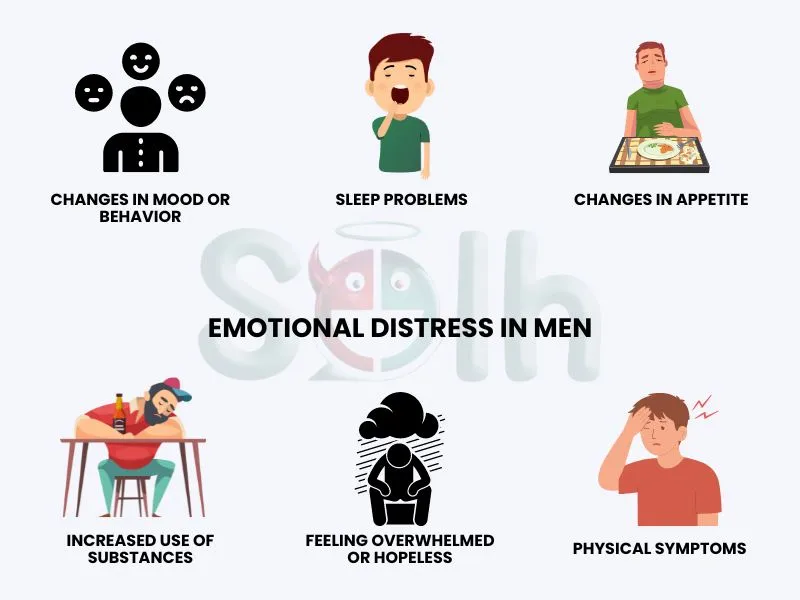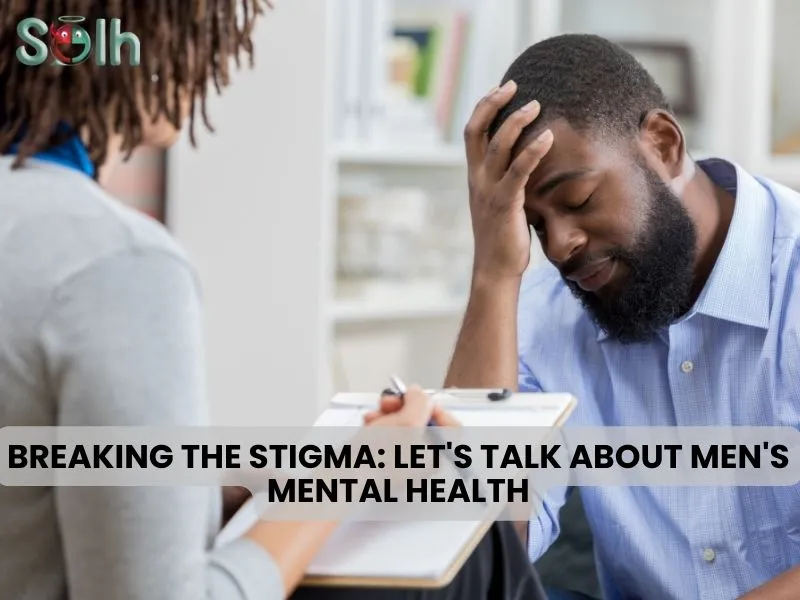Alright, men! Let's talk about something real, something that affects us all but often gets pushed aside: our mental health. It's high time we ditch the silence because strong minds are just as important as strong bodies. So, brew a fresh pot of coffee, settle into your favorite chair, and crack open a conversation that's long overdue.
Today, we're diving deep into the world of men's mental well-being, unpacking the challenges, celebrating the strengths, and charting a course towards a healthier, happier you. Buckle up, fellas; this is gonna be an empowering ride.
Unpacking the Stigma
In today's world, we're still wrestling with this outdated image of masculinity, the one where men are supposed to be emotionless rocks, all bulging biceps and stiff upper lips. We hear it all the time: "Man up," a phrase tossed around like a participation trophy but devoid of any real understanding.
This pressure to be a stoic superhero can trap men in a cycle of silence, bottling up their emotions until they're on the verge of bursting. But here's the truth, fellas: strength isn't about suppressing what you feel; it's about acknowledging it, understanding it, and then dealing with it in a healthy way.
That's why we need to smash this unrealistic expectation and build a space where men can talk about their mental health openly and honestly without judgment. It's time to redefine what it means to be strong. It's time to be vulnerable. It's time to be well.
Recognizing the Signs
First things first, let's ditch the stereotype that seeking help is a sign of weakness. It's time to retire the "man up" mentality and swap it for "man up and get help." Just like everyone experiences physical health challenges, mental health struggles are just as common. Men are no exception – from feeling buried under work stress to battling anxiety or depression, there's a wide range of mental health issues that can hit hard. The key here is recognizing the signs, both for ourselves and the men in our lives, so we can offer support and break the cycle of silence.
Here's the thing: men often express emotional distress differently than women. While sadness or tearfulness might be a clear sign in one person, it could manifest differently in another. So, what should we be looking for? Here are a few red flags:
Changes in mood or behavior: Watch for irritability, anger outbursts, or social withdrawal. A guy who used to be the life of the party but now avoids going out could be struggling.
Sleep problems: Difficulty falling asleep, waking up frequently, or sleeping excessively can all be indicators of mental health issues.
Changes in appetite: Noticeable weight loss or gain due to a sudden disinterest in food or emotional overeating could be a sign.
Increased use of substances: Is he relying more on alcohol or drugs to cope with stress or difficult emotions?
Loss of interest in hobbies: Has he abandoned activities he used to enjoy?
Feeling overwhelmed or hopeless: Pay attention to comments about feeling constantly stressed, unable to cope, or having a sense of despair.
Physical symptoms: Men sometimes experience physical problems like headaches, stomachaches, or body aches that have no medical explanation and are triggered by emotional distress.
If you spot a few of these signs in yourself or a friend, remember, it's not a sign of weakness, it's a sign you need support. There's no shame in reaching out for help.

Awareness is the spark that ignites change. By openly discussing men's mental health, we can shatter the stigma surrounding it and empower men to seek the help they deserve. Imagine a world where "man up" isn't a dismissive phrase but a rallying cry to prioritize mental well-being. This cultural shift starts with open conversations. Social media campaigns can break down stereotypes by featuring relatable stories of men from all walks of life who have battled and triumphed over mental health challenges. Think of short video clips where a construction worker talks about managing anxiety through meditation or a young entrepreneur shares his experience with therapy.
Let's flood the internet with real men, real struggles, and real solutions. But awareness goes beyond the digital realm. Community events can create safe spaces for men to connect and share. Organize local hiking groups where men can bond over nature and conversation or host sports tournaments with a mental health resource fair at halftime. The key is to break the isolation and foster a sense of camaraderie, letting men know they're not alone in their struggles. The workplace is another crucial battleground. Companies can champion mental health by offering workshops on stress management and emotional intelligence.
Promote healthy work-life balance with flexible schedules and encourage employees to take breaks. Normalize mental health days, just like sick days, and create a culture where open communication about mental well-being is valued. Let's celebrate the heroes in this fight – the men who have dared to be vulnerable and prioritize their mental health. Shout out to the single dad who attends therapy sessions to become a better parent. Recognize the CEO who takes a mental health day to recharge and avoid burnout. Applaud the athlete who speaks openly about his struggles with depression, inspiring others to seek help.
These men are breaking down barriers and paving the way for a future where mental well-being is seen as a strength, not a weakness. This movement needs everyone's participation. Men, it's time to shed the armor of stoicism. Talking about your mental health isn't a sign of weakness; it's a sign of strength and self-awareness. Be a role model for the younger generation and show them that emotional vulnerability is a sign of courage. Friends, family members, and colleagues are the support systems men need. Listen without judgment, offer encouragement, and help them find resources. Educate yourselves about the signs of mental health struggles in men, and don't hesitate to gently nudge them towards seeking help.
Remember, a strong community is built on shared experiences, not suppressed emotions. By working together, we can create a world where men feel empowered to prioritize their mental well-being, leading to a healthier, happier future for everyone.
The Strength of Connection: A Lifeline for Men's Mental Health
Men are often depicted as solitary figures, weathering storms alone. But the truth is, connection is the bedrock of good mental health, and building a strong support network is a powerful tool for men facing challenges. Friends, family – these are the anchors that hold us steady during life's rough seas.
More Than Just a Listening Ear: The Power of Professional Help
There are times when a friend's shoulder just isn't enough. And that's perfectly okay. Seeking professional help is not a badge of weakness, but a sign of strength and self-awareness. Therapists, counselors, and psychiatrists offer a wealth of expertise tailored to address the specific needs of men's mental health. Don't hesitate to encourage men to explore these valuable resources.
Self-Care: Not Selfish, But Essential
Self-care isn't a passing fad; it's the fuel that keeps us running. For men, this might look like hitting the gym for a stress-busting workout, practicing mindfulness through meditation, or finally diving into that neglected hobby. Prioritizing activities that nourish the mind and body isn't selfish; it's an investment in overall mental well-being.
Shifting the Narrative: From Stigma to Support
It's time to rewrite the narrative around men's mental health. Let's swap outdated stereotypes of stoicism for messages of compassion, understanding, and solidarity. When men feel supported and empowered to talk openly about their struggles, the path to healing becomes clearer. By reshaping the conversation, we can create a culture that celebrates emotional vulnerability as a sign of strength, not weakness.
A Call to Action: Building a Brighter Future
Let's be clear: Men's mental health deserves our unwavering attention. By dismantling the stigma, raising awareness, and fostering a culture of openness, we can create a world where men everywhere feel empowered to prioritize their well-being. Remember, seeking help is a courageous act, not a sign of weakness. It's okay not to be okay.
Let's continue to be the support system men need: listening ears, encouraging voices, and guiding hands. Together, we can break the silence and build a future where men can prioritize their mental well-being without fear or judgment. This is a collective effort, and the potential for positive change is immense. It's time to break the silence, embrace vulnerability, and create a world where mental wellness thrives for all.
Solh provides Tailored Resources for Men
Normalizes Seeking Help: Solh dismantles the stereotype of seeking help as a weakness. It provides a judgment-free zone within the corporate environment, encouraging open communication about mental health.
Journaling Prompts: These prompts are designed specifically for men, helping them explore their emotions and thought patterns in a way that feels comfortable.
Anonymous Support Groups: Connecting with other men facing similar struggles fosters a sense of community and belonging. Men can share experiences and find comfort in knowing they're not alone.
Solh Talk Now: This feature allows men to connect instantly with a qualified counselor for confidential consultations directly through the Solh app. There's no pressure for in-person appointments, making it easier to overcome hesitation.
Solh Buddy: This personalized virtual companion provides ongoing encouragement and reminders specifically for men, keeping mental well-being top-of-mind throughout the day.
Nature Connection: Solh promotes incorporating "micro-breaks" in nature, like short walks or park visits. Studies show reconnecting with the environment reduces stress and improves mood, boosting overall well-being.
Eco-Friendly Practices: Solh encourages small, sustainable choices that contribute to a healthier planet. This combats eco-anxiety, a common concern for men, while also promoting a sense of purpose.
By providing these resources and creating a safe space, Solh empowers men to prioritize their mental health. This, in turn, leads to a happier, healthier, and more productive workforce.



